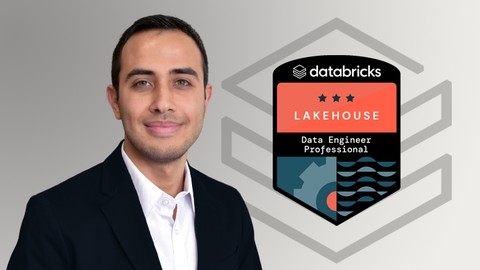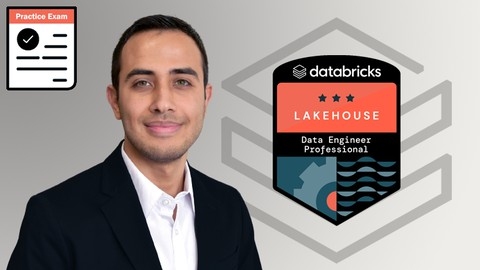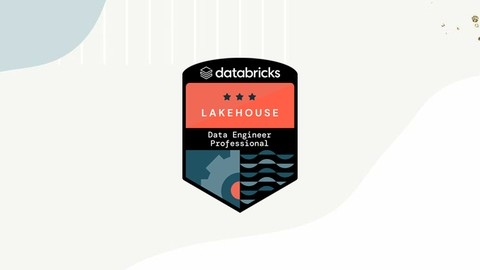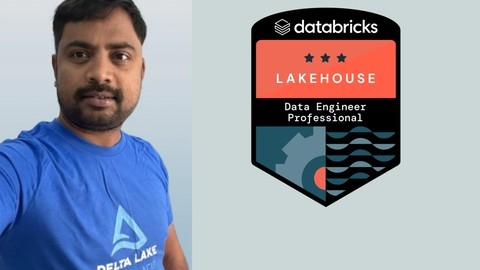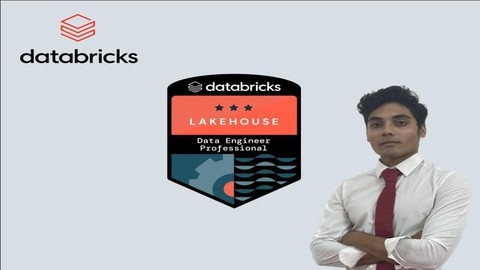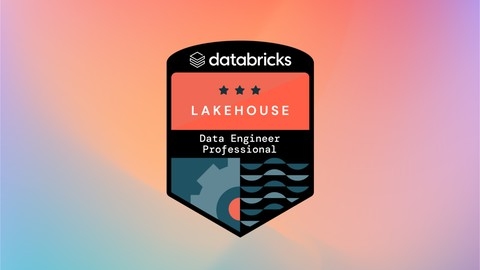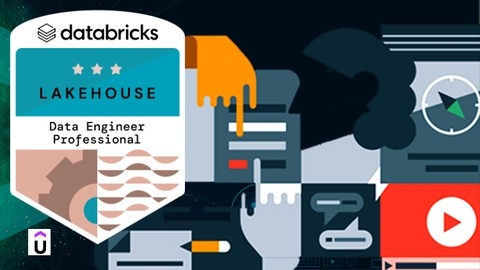Databricks Certified Data Engineer Professional certification is a coveted credential for data professionals, signifying expertise in building robust data pipelines, optimizing Databricks workloads, and implementing advanced analytics and machine learning models.
Earning this certification showcases your ability to leverage Databricks for transforming data into valuable insights, opening doors to exciting career opportunities and higher earning potential.
Finding a top-notch Databricks Certified Data Engineer Professional certification course on Udemy can feel like searching for a needle in a haystack.
With so many options available, it’s hard to tell which course truly delivers on its promises and prepares you for the challenging exam.
You want a course that goes beyond the basics, providing comprehensive coverage, practical experience, and guidance from experienced instructors.
For the best Databricks Certified Data Engineer Professional course on Udemy overall, we recommend "Databricks Certified Data Engineer Professional -Preparation".
This course stands out for its in-depth coverage of essential topics like data modeling, pipeline building, and production pipeline management within the Databricks ecosystem.
It provides a unique blend of theoretical knowledge and hands-on practice, empowering you to build robust data solutions using the Lakehouse architecture, optimize ETL pipelines with Apache Spark and Delta Lake APIs, and leverage Databricks tools like the CLI and REST API for deployment and configuration.
While this course is our top pick, it’s just the beginning of your journey to becoming a Databricks Certified Data Engineer Professional.
Keep reading to discover a curated list of other excellent options, each with its own unique strengths and features, catering to different learning styles and preferences.
Databricks Certified Data Engineer Professional -Preparation
You will learn how to model data management solutions using the Lakehouse architecture, including bronze, silver, and gold layers, as well as general data modeling concepts like constraints and lookup tables.
A significant portion of the course focuses on building data processing pipelines using Spark and Delta Lake APIs.
You will learn how to build batch and incremental ETL pipelines, deduplicate data, use Change Data Capture (CDC) to propagate changes, and optimize workloads.
The course covers the benefits of using the Databricks platform and its tools, such as the Databricks CLI for deploying notebook-based workflows and the Databricks REST API for configuring and triggering production pipelines.
You will also learn best practices for building production pipelines with proper security and governance, including managing cluster and job permissions with ACLs, creating dynamic views to control user/group access, and securely deleting data according to GDPR and CCPA regulations.
Additionally, the course teaches you how to configure alerting and storage to monitor and log production jobs, record logged metrics, and debug errors.
Best practices for managing, testing, and deploying code are covered, including relative imports, scheduling jobs, and orchestration jobs.
Throughout the course, you will have hands-on opportunities to apply the concepts you’ve learned, such as working with multiplex bronze ingestion patterns, streaming deduplication, slowly changing dimensions, processing CDC feeds, stream-stream joins, and partitioning Delta Lake tables.
Practice Exams: Databricks Data Engineer Professional
You’ll get hands-on experience with 60 multiple-choice questions for each practice test, covering key topics like data modeling, processing pipelines, Databricks tooling, security, monitoring, and deployment best practices.
The course dives deep into data management solutions, teaching you about the Lakehouse architecture, tables, views, and data modeling concepts.
You’ll learn to build batch and incremental ETL pipelines using Spark and Delta Lake APIs, handling tasks like deduplication and Change Data Capture.
Optimizing workloads is also covered.
Mastering the Databricks platform is essential, so you’ll learn to use tools like the CLI for deploying notebook workflows and the REST API for configuring production pipelines.
Crucial security and governance aspects like managing cluster permissions with ACLs and controlling user access through views are included.
Monitoring production jobs is important, so you’ll learn to configure alerting, record metrics, and debug errors.
Following best practices for code management, testing, and deployment via techniques like relative imports, job scheduling, and orchestration is also part of the curriculum.
With 120 minutes per practice test and detailed explanations, you’ll gain confidence tackling the actual certification exam.
The questions are distributed across data processing (30%), Databricks tooling (20%), data modeling (20%), security/governance (10%), monitoring/logging (10%), and testing/deployment (10%).
Databricks Data Engineer Professional - Practice Exams
You’ll get three full-length mock exams with 180 carefully crafted questions that align with the official exam syllabus.
Each question tests a specific exam topic and provides detailed explanations, ensuring you fully understand the concepts.
The explanations go in-depth, making this course valuable for learning, not just practicing.
Additionally, every coding question includes a Databricks Notebook you can import and work with, providing a hands-on experience.
The course covers all exam sections, including Databricks Tooling, Data Processing, Data Modeling, Security and Governance, Monitoring and Logging, and Testing and Deployment.
The difficulty level and question order mimic the actual exam, giving you a realistic practice environment.
One standout feature is the sample question provided, which demonstrates the level of detail and quality you can expect.
The explanation walks through the solution step-by-step, leaving no room for confusion.
While the course aims to help you pass on the first attempt, the creators recommend scoring at least 85% on each practice exam before taking the real one.
This emphasis on thorough preparation sets this course apart.
DataBricks Certified Data Engineer Professional Tests 2024
The course offers an extensive collection of practice tests specifically designed to prepare you for the certification exam.
You’ll find detailed timed assessments that align perfectly with the official Databricks certification blueprint.
These tests comprehensively cover critical data engineering aspects within the Databricks environment.
After each test, you’ll receive in-depth explanations for your responses, along with links to relevant Databricks documentation.
This approach solidifies your understanding and guides you through strategies for accurate solutions.
The Databricks Certified Data Engineer Professional certification validates your expertise in building robust data pipelines, optimizing Databricks workloads for performance and cost, and implementing advanced analytics and machine learning models.
Achieving this certification showcases your proficiency in leveraging Databricks to transform data into actionable insights.
The certification exam challenges you with real-world data engineering tasks on Databricks, covering areas like data ingestion, transformation, storage, performance optimization, and machine learning.
This course’s practice tests mirror the exam’s content and difficulty level, featuring a wide array of question types drawn from official study materials and expert insights.
With over 400 questions, you’ll have ample opportunity to validate your expertise and gain confidence before attempting the actual exam.
The course aims to help you achieve a passing score of 70% or above on your first attempt.
It provides clear and precise questions, detailed explanations, and references to Databricks documentation for further study.
Databricks Data Engineer Professional Practice Exam
The course provides full-length practice exams that mimic the actual certification exam’s format and difficulty level.
With 60 multiple-choice questions covering all exam domains, you’ll get a realistic experience to prepare for the real thing.
One standout aspect is that the practice tests are developed by experts with extensive experience in Databricks and the certification process.
This ensures you receive accurate and relevant practice questions, covering crucial topics like data modeling, ETL pipelines, Delta Lake, Apache Spark, MLflow, and more.
You’ll also encounter questions on essential skills like securing and monitoring your data pipelines, testing before deployment, and leveraging tools like the Databricks CLI and REST API.
What sets this course apart is its focus on helping you master the practical application of data engineering concepts using Databricks.
You’ll learn to build optimized ETL pipelines, model data into a lakehouse architecture, and ensure your pipelines are secure, reliable, and thoroughly tested.
The course covers coding examples primarily in Python, but SQL is used for Delta Lake functionality, giving you a well-rounded experience.
You’ll gain confidence and the practical skills needed to excel in advanced data engineering tasks using the Databricks platform.
Databricks Data Engineer Professional - Practice Exams
This course offers high-quality practice exams to evaluate your exam readiness.
The course includes 120 unique practice questions, split into two exams with 60 questions each.
These practice tests accurately reflect the difficulty of the actual certification exam questions, providing the most realistic exam experience on the platform.
If you’re looking for easy questions, these practice tests might not be for you.
The questions mirror the actual certification exam, helping you better understand the Databricks Certified Professional concepts.
The questions are regularly updated based on feedback from students who recently took the Databricks exam, ensuring they align with the latest exam format.
You’ll gain a profound understanding of all topics covered in the Databricks Certified Professional Data Engineer exam.
The test report pinpoints areas for improvement, building the confidence to excel in the actual certification exam.
This course offers exam-style questions with detailed explanations, fortifying your understanding of core Databricks concepts.
The test report highlights areas to focus on, and regular updates keep the content current.
You’ll also receive free bonus material and a realistic exam simulation.
These practice exams are your best chance to ace the Databricks Certified Professional Data Engineer exam because they are 100% aligned with the latest exam format, simulating the real certification environment.
Detailed explanations clarify correct and incorrect answers, supporting your understanding of key concepts.
With regular question updates based on student feedback, this course’s proven approach helps students achieve an average exam score over 85%.
Databricks Data Engineer Professional Test Series
The course covers all the key topics you need to master for the certification exam, including Databricks tooling, data processing, data modeling, security and governance, monitoring and logging, and testing and deployment.
You’ll get hands-on experience with 60 multiple-choice questions per practice exam, mimicking the actual certification exam format.
The questions are designed to assess your ability to use Databricks for advanced data engineering tasks, such as building optimized ETL pipelines, modeling data in a lakehouse, and ensuring data pipeline security, reliability, and monitoring.
One of the standout features of this course is its focus on practical application.
You’ll learn how to work with tools like Apache Spark, Delta Lake, MLflow, and the Databricks CLI and REST API.
This real-world experience will be invaluable as you prepare for the certification exam and your future career as a Databricks Data Engineer.
The course is structured around six main topics: Databricks Tooling (20%), Data Processing (30%), Data Modeling (20%), Security and Governance (10%), Monitoring and Logging (10%), and Testing and Deployment (10%).
Each practice exam includes questions from all these areas, ensuring you gain a comprehensive understanding of the Databricks platform.
To get the most out of this course, it’s recommended that you first complete the Databricks Partner Academy course.
This will provide you with the foundational knowledge needed to tackle the practice exams effectively.
With each attempt, you’ll receive detailed explanations, helping you reinforce your understanding of the concepts and prepare for any twist or variation in the actual exam questions.
2024: Databricks Data Engineer Professional Practice Exams
You will learn how to perform advanced data engineering tasks using Databricks and its associated tools like Apache Spark, Delta Lake, MLflow, and the Databricks CLI and REST API.
The course covers building optimized and cleaned ETL pipelines, modeling data into a lakehouse, and ensuring data pipelines are secure, reliable, monitored, and tested before deployment.
You’ll gain an understanding of data modeling concepts, governance, monitoring, logging, testing, and deployment processes.
With a focus on hands-on experience, the course prepares you for the proctored certification exam consisting of 60 multiple-choice questions to be completed within 120 minutes.
The exam assesses your proficiency across six domains: Databricks Tooling, Data Processing, Data Modeling, Security and Governance, Monitoring and Logging, and Testing and Deployment.
The course includes five practice exams to help you gauge your readiness and identify areas for improvement.
While no prerequisites are mandatory, related training and at least one year of hands-on data engineering experience are highly recommended.
Upon passing the exam, your certification will be valid for two years, after which recertification is required to maintain your status as a Databricks Certified Data Engineer Professional.
